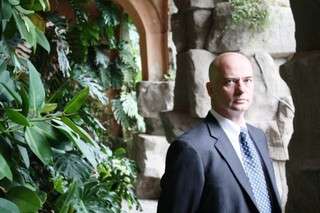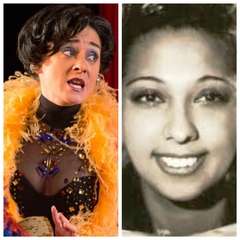|
Back
Americans in Paris and Purgatory New York
Christ & St. Stephen’s Church
12/01/2018 -
Tom Cipullo: Josephine – After Life
Melissa Wimbish (Josephine Baker), Jennifer Beattie (Gertrude Stein), Stephen Eddy (Pablo Picasso), Sara Paar (Holocaust Victim)
Chamber Orchestra: Jestin Pieper (Piano), Catherine Gregory (Flute), Vasko Dukowski (Clarinet), Benjamin Russell (Violin), Emily Brausa (Cello), Benjamin Grow (Music Director/Conductor)
Dean Anthony (Stage Director), Claire Townsend (Costume Designer), Tom Henry (Set Designer and Decor)

T. Cipullo (© Hedwig Broukaert)
“I have walked into the palaces of kings and queens and into the houses of presidents. And much more. But I could not walk into a hotel in America and get a cup of coffee, and that made me mad.”
Josephine Baker (1906-1975)
When composing an opera about a historical figure, one inevitably wonders how the subject would react to the impersonation. With the case of Josephine Baker, the eponymous heroine of Tom Cipullo’s Josephine, one has no doubts. First, because the real Josephine Baker–like Eartha Kitt, the woman who idolized her–was open to every art, idea, physical/social movement. Second, because she would have delighted in the acting/singing role given to Melissa Wimbush.
No, I won’t go into the real Josephine Baker. She was too exciting and eclectic for a short review. Ms. Baker herself felt that her legs were okay, but her face was only “amusing.” She was–from what one can see on YouTube–a fabulous dancer and singer. And her wardrobe (much of the exotica replicated by costume designer Claire Townsend here) was so elegantly outrageous, she would have made Lady Gaga look like a fishwife.
Josephine was the first of two operas by Mr. Cipullo, both of them about expatriates in Paris during the first half of the last century. Both were totally different. And if the second opera, After Life, was more serious, more enigmatic, Josephine’s one-woman presentation by Melissa Wimbish simply blew away all those notes by Mr. Cipullo, and the splendid chamber orchestra conducted by Benjamn Grow.
How Tom Cipullo composed and wrote this one-woman monodrama was as good an attempt as possible to make the lady accentuated in a short opera. The set was a semi-gaudy backstage dressing room, a closet filled with dresses, a makeup table where “Josephine” could sit and talk in 1975, before her final performance, through the (non-existent) mirror, a standing light serving as a prop.

M.Wimbish/J.Baker
(© Theresa Wood/Aaregistry.com)
And then there is Melissa Wimbish herself. The official production picture above gives not the slightest indication of Ms. Wimbish’s movements, acting, rhythms.
The movements changed, of course. She could be sassy within limits, regal without limits. In her operatic monologue, she speaks of her upbringing, her “high yaller” status, her laundress mother, her successes and her failures, her triumphs and–very rarely–tragedies. Ms. Wimbish never stops moving. Outside of the voice (see below), she is a dancer, a mime, an acrobat, she is the very picture of a Josephine Baker whose confessions are never bathetic, whose four husbands are never regrets.
Where Sinatra/Anka’s My Way shows an arrogance, a foul-mouthed hauteur, Ms. Wimbish/Josephine’s “way” is that of a woman whose genius in entertainment (like Sinatra) leads to a humanity, a bravery (as a spy), a mother of us all (adopting children from around the world), a human fullness for which Sinatra was never capable.
And what of Mr. Cipullo’s music? One would have hoped that he could have quoted or replicated Josephine Baker’s own wild dance music or bluesy-French songs. If he did, then I never caught it. Instead we had a sprechstimme (or in Ms. Baker’s French, probably parler/chanter) where Ms. Wimbish effortlessly rose to a high A or B on the scale. A few near-jazz riffs, but nothing near Josephine Baker’s grandeur.
(How could any mere opera-composer replicate a woman who said once, “I wasn’t really naked. I simply didn’t have any clothes on.”)
So effortlessly, that one hardly notices her phenomenal range. Or her phenomenal brilliance as she walks, sits prances, dances around the stage. Her movements can only be called iridescent, and one knows that Josephine Baker would have smiled and approved and delighted in such a bravura performance.
The next and longest opera was After Life, starring a Gertrude Stein and a Pablo Picasso (émigrés from America and Spain), and Sara Parr (an émigré from a concentration camp), now all in a kind of purgatory or Hades or (as the title has it) an After Life.
We start with Gertrude Stein, played with a restrained mezzo, by Jennifer Beattie, sitting at her Purgatorial desk, setting down words, singing with semi-Wagnerian tones. Next to her by an empty easel, is Pablo Picasso, an extremely enthusiastic Steven Eddy. He discovers her, they both argue about why they are together after they die. He claims art is for life, he accuses her of living in luxury during the Pétain Nazi Government.
And so it goes...until into their disputes comes wistful soprano Sara Paar, presenting Gertrude Stein with a rose. (Yes, that rose, the rose which is a rose is a rose.) From a concentration camp she comes. With memories, with nostalgia, trying to prompt both these self-promoting artists to understand...
To understand what art is all about. Whether, when, how it should deal with reality. Questions which could hardly be answered in one operatic piece.
David Mason’s libretto asks the questions, though. And Mr. Cipullo has the chance to give a far more complex musical picture than in Josephine. Where the latter rarely strays beyond the summary, the recitative, After Life music has a chance for ensembles, real trios, real duets, coming close to Puccini-like lines, though hardly reaching Puccini or even Menotti.
Even more were the styles he enlisted for each singer. The Stein-Beattie character was as guarded as the writer herself. Ms. Beattie hardly had the plump self which Picasso portrayed in that famous painting. But the severe gray wig was evocative enough.
The Picasso/Eddy character was more problematic. The insignia was that famous black-white striped shirt. The music, though, was very very Bernstein-West Side Story music, and one expected Mr. Eddy to burst into Maria.
Ms. Paar was totally satisfactory. The simplicity with which she presented the rose to Ms. Stein (ah, visions from the last act of Rosenkavalier!) was touching, her solos reaching to the highest stratospheres were wondrous, and her Anne Frank-like chastity was touching.
Of the two operas, After Life was more profound, more audacious, more complex both in music and words. Yet Josephine, for this listener, was closer to the bone, closer to revealing another artist.
True, nothing–no documentary film, no book, no dramatic film, certainly no opera–could catch the real Josephine Baker. Melissa Wimbish gave it such a dynamism, such extraordinary spirit, that she made this ghost of Josephine Baker come oh so vibrantly alive.
CODA: The two Cipullo works were produced by Chelsea Opera, a group which actually survives and thrives in the New York jungles of concert producers. Going into their 15th year, they've done not only Butterflyand Figaro and Amahl, but The Bear, Margarita Madness and, later this year The Jazz Nativity. As well as Mr. Cipullo's operas. And more. All fully staged with chamber orchestras including the best musicians around Manhattan. How they manage to still exist amidst the endless competition is their secret. But us writers and audiences in general have benefitted mightily from their efforts.
Harry Rolnick
|